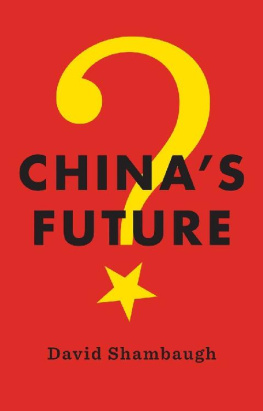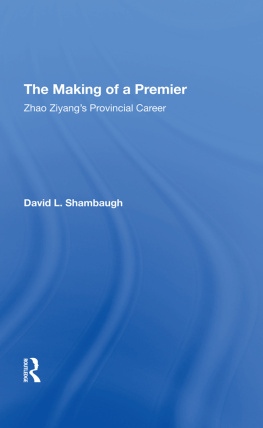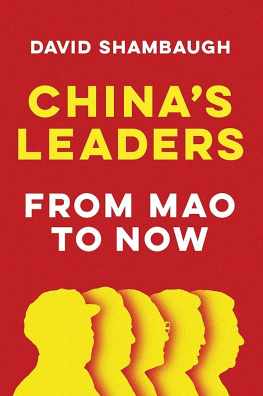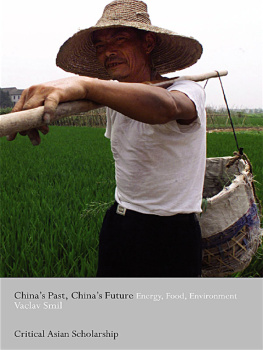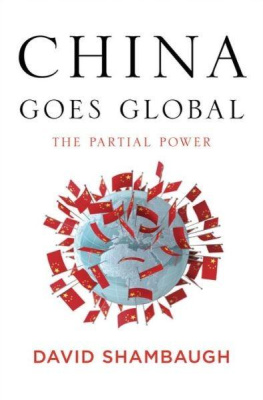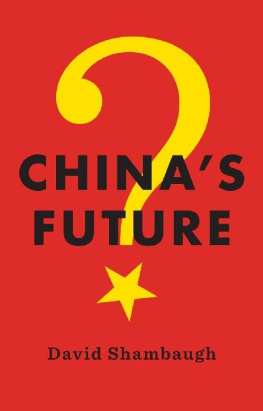Shambaugh - Chinas Future
Here you can read online Shambaugh - Chinas Future full text of the book (entire story) in english for free. Download pdf and epub, get meaning, cover and reviews about this ebook. year: 2016, publisher: Polity;Wiley, genre: Politics. Description of the work, (preface) as well as reviews are available. Best literature library LitArk.com created for fans of good reading and offers a wide selection of genres:
Romance novel
Science fiction
Adventure
Detective
Science
History
Home and family
Prose
Art
Politics
Computer
Non-fiction
Religion
Business
Children
Humor
Choose a favorite category and find really read worthwhile books. Enjoy immersion in the world of imagination, feel the emotions of the characters or learn something new for yourself, make an fascinating discovery.
Chinas Future: summary, description and annotation
We offer to read an annotation, description, summary or preface (depends on what the author of the book "Chinas Future" wrote himself). If you haven't found the necessary information about the book — write in the comments, we will try to find it.
Chinas Future — read online for free the complete book (whole text) full work
Below is the text of the book, divided by pages. System saving the place of the last page read, allows you to conveniently read the book "Chinas Future" online for free, without having to search again every time where you left off. Put a bookmark, and you can go to the page where you finished reading at any time.
Font size:
Interval:
Bookmark:
Dedicated to Harry Harding
David Shambaugh
polity
Copyright David Shambaugh 2016
The right of David Shambaugh to be identified as Author of this Work has been asserted in accordance with the UK Copyright, Designs and Patents Act 1988.
First published in 2016 by Polity Press
Polity Press
65 Bridge Street
Cambridge CB2 1UR, UK
Polity Press
350 Main Street
Malden, MA 02148, USA
All rights reserved. Except for the quotation of short passages for the purpose of criticism and review, no part of this publication may be reproduced, stored in a retrieval system, or transmitted, in any form or by any means, electronic, mechanical, photocopying, recording or otherwise, without the prior permission of the publisher.
ISBN-13: 978-1-5095-0716-0
A catalogue record for this book is available from the British Library.
The publisher has used its best endeavours to ensure that the URLs for external websites referred to in this book are correct and active at the time of going to press. However, the publisher has no responsibility for the websites and can make no guarantee that a site will remain live or that the content is or will remain appropriate.
Every effort has been made to trace all copyright holders, but if any have been inadvertently overlooked the publisher will be pleased to include any necessary credits in any subsequent reprint or edition.
For further information on Polity, visit our website:
politybooks.com
This book has its origins in a keynote lecture I gave in July 2014 at the China at the Crossroads Conference at the Contemporary China Research Center of Victoria University in Wellington, New Zealand. Trying to think through the totality of China and its future trajectory for that event was a challenge, but it percolated in my brain over the subsequent year. During this time I took advantage of invitations to lectureat the American Academy in Berlin, the University of Edinburgh, the School of Oriental and African Studies at the University of London, and several universities in the United Statesto further refine my thinking and revise the lecture. I am most grateful to professional colleagues, students, and members of the audiences for pushing me further in my thinking about Chinas current state and potential future directions.
As I revised the lecture many times for successive events, I kept wondering what else I could do with the material. It is, after all, one thing for a scholar to give a lecture speculating on the sensitive subject of Chinas future, but quite another to go into print on it. What turned the material from a lecture into this book came to me one evening just as I finished reading Joseph S. Nyes Is the American Century Over? As I marveled at the compact nature (physically and intellectually) of Nyes latest book, it suddenly dawned on me that the lecture I had been giving could be fleshed out into a similar short volume. So I shot Joe an email inquiring about his experience publishing with Polity Press. He responded quickly and very positively, putting me in touch with Louise Knight, the Politics and International Relations editor at Polity. It did not take long for me to elucidate the idea with Louise in emails and a transoceanic phone conversation before she signed me up with a contract for this volume. I am very impressed by the quality of Politys publications list and the niche they have carved out in the market with short and topical books that examine key issues of the day. The idea of writing a relatively short book about Chinas future appealed to me (despite the daunting nature of the subject). All of my previous books gestatedthrough research and writingfor about five years each. This one I wrote over eight weeks during the summer of 2015! Once again I was fortunate to retire to our cabins in northern Michigan overlooking Grand Traverse Bay, the perfect place to think and write. I am deeply grateful to my familymy wife Ingrid and sons Christopher and Alexanderfor their patience and tolerance as I wrote during vacation time.
I also wish to thank the Smith Richardson Foundation, and particularly Senior Vice-President and Director of Programs Marin Strmecki, for a grant (SRF Grant #2015-0941) to support the research and writing of this book. This is the third of my books that the foundation has supported, for which I am truly grateful. I also wish to thank my home institutionthe Elliott School of International Affairs at The George Washington Universityfor a Strategic Opportunities for Academic Research (SOAR) award. The Elliott School has now been my professional home for two decades, and I am most grateful for the collegial community and research support it has provided.
I also wish to particularly thank my colleagues and friends Bob Ash, Pieter Bottelier, Bruce Dickson, Tom Gold, Chris Horner, David Lubin, Andrew Nathan, Bob Sutter, and Michael Yahuda for taking the time to read individual draft chapters. Their expertise helped much to substantively improve the manuscript and save me from embarrassing errors. I also wish to thank Ann Klefstad for her excellent copyediting of the manuscript, while Louise Knight, Nekane Tanaka Galdos, and Neil de Cort at Polity Press have all been a true pleasure to work with throughout the publication process.
Finally, I wish to dedicate this volume to Harry Harding. He and I first met in 1978 and have been close friends and colleagues ever since. While I was not his student, Harry mentored me from afar during my graduate school years and offered me important academic opportunities. If he had not been supportive of my application for a scholarship to go to China to conduct my doctoral dissertation research, I would not have been selected and thus likely would never have had an academic career. He rescued me at a critical juncture in my graduate education. Subsequently, Harry also became my Dean and faculty colleague at George Washington Universitys Elliott School of International Affairs, after he lured me back across the Atlantic from England where I was then resident and teaching. We have remained in close contact since he decamped from GWU to go to the University of Virginia and Hong Kong University of Science and Technology. We share the same areas of professional interest and expertiseChina, Asia, and U.S.-China relationsand have interacted in countless conferences on these topics over the years. I have always marveled at Harrys extraordinary intellectual ability to incisively analyze a problem or an issue, and to place it in a larger context. He sees the forest when the rest of us only see trees. He has thus pushed me to think about things in ways I otherwise would not have done. This volume is another instance. Among his other intellectual and professional pursuits, Harry has become something of an expert on forecasting and political risk analysis, as a result of a year he spent as Director of Research at the Eurasia Group in New York. As I was planning and thinking through this volume, he was extremely helpful in getting me to read into the political risk literature broadlywhile this book may not reflect the paradigms of this mini-profession of risk analysis, the literature did help me to conceptualize the study. For all of these reasons, I am deeply grateful to Harry and have always held him in very high personal and professional regardand therefore I admiringly dedicate this volume to him.
This is a relatively short book about a Big Topic: Chinas future. As one of the key global uncertainties over the coming decades, Chinas evolution will continue to have consequencesfor better and for worsefor the whole world. Chinas future development is also going to be
Font size:
Interval:
Bookmark:
Similar books «Chinas Future»
Look at similar books to Chinas Future. We have selected literature similar in name and meaning in the hope of providing readers with more options to find new, interesting, not yet read works.
Discussion, reviews of the book Chinas Future and just readers' own opinions. Leave your comments, write what you think about the work, its meaning or the main characters. Specify what exactly you liked and what you didn't like, and why you think so.

